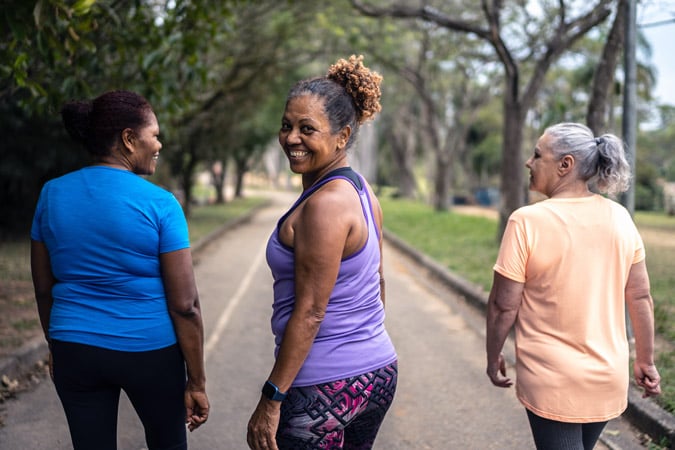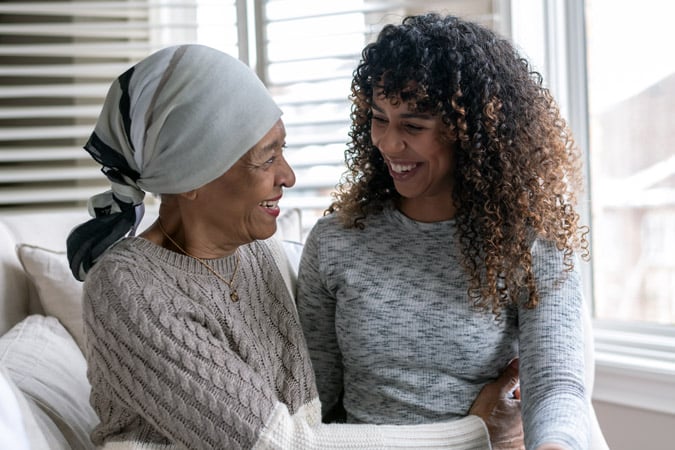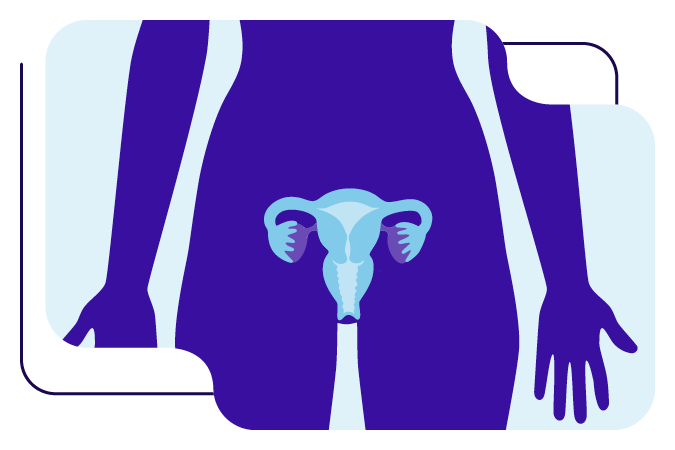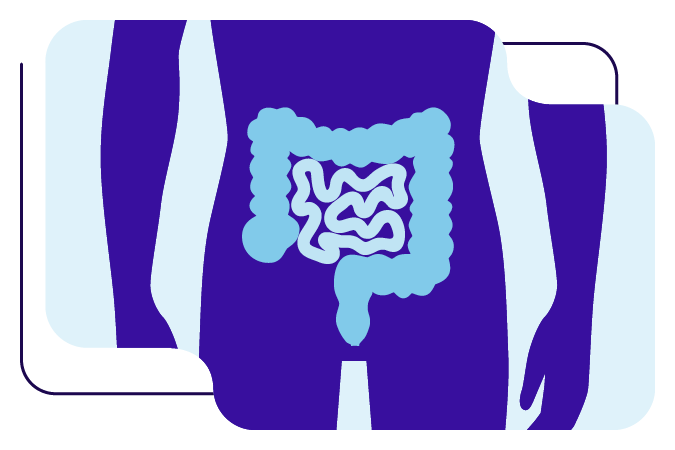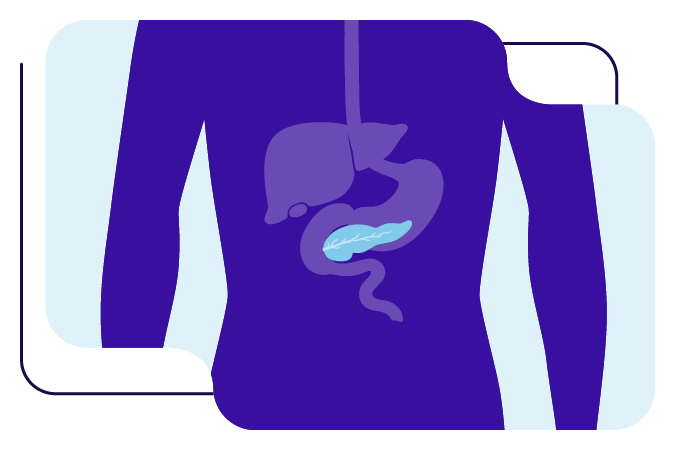About breast cancer
Find out more about what breast cancer is and who is affects.
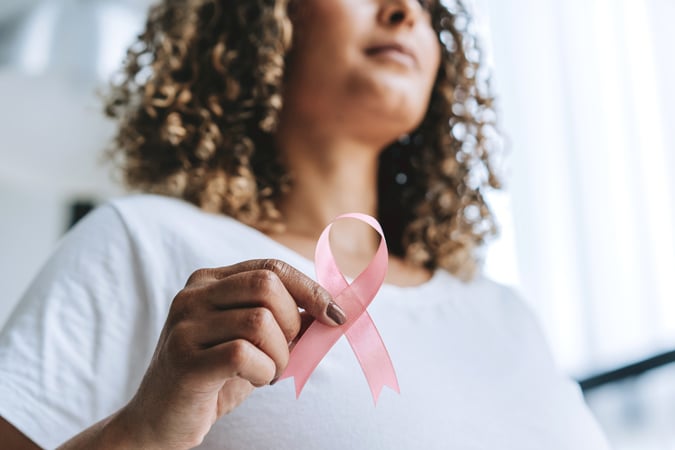
On this page
What is breast cancer?
Breasts are made up of fatty tissue, milk glands and ducts. Breast tissue develops as a response to hormones throughout life – especially during puberty, pregnancy and breastfeeding.
Breast cancer occurs when cells in the breasts become damaged and grow in an abnormal way, forming a lump or thickening, known as a tumour.
There are many different types of breast cancer. Most breast cancers begin in the ducts that carry milk to the nipple or in the glands that produce milk.
How common is breast cancer?
Breast cancer in women is the most common cancer in the UK, with around 58,700 new cases in 2022.
Globally, it is the most common cancer in women and, in 2022, the second most common cancer overall with over 2.29 million cases.
While breast cancer in women is common, there are steps you can take to help reduce your risk.
Sources: UK cancer statistics based on combined data from England, Scotland, Northern Ireland and Wales. World Cancer Fund, 2024. International cancer statistics from Globocan.
Breast cancer in ethnic minority communities
In the UK, breast cancer is less common in women from South Asian, Black, Chinese, mixed and other ethnic minority backgrounds than in white women. However, women from these groups are often diagnosed at a later stage, making the cancer more difficult to treat and thereafter they have lower survival rates. This may be because of lower awareness of symptoms, problems accessing care and delays in getting support.
Raising awareness about breast screening and early diagnosis, and ensuring care is accessible and inclusive, can help improve outcomes for everyone.
> Visit Breast Cancer Now for more information on breast cancer in ethnic minority communities.
Breast cancer in men
Breast cancer can also affect men, although it is much less common. In 2021, there were around 400 new cases in the UK.
> Visit Breast Cancer Now for more information on breast cancer in men.
Stay informed
Breast cancer can affect anyone and finding it early gives you the best chance of successful treatment. It’s important to know what’s normal for you and to speak to your GP if you notice any unusual changes.
More breast cancer information for you
-
References
- Breast cancer in women [Internet]. NHS. Available from: https://www.nhs.uk/conditions/breast-cancer-in-women/
- Breast cancer in men [Internet]. NHS. Available from: https://www.nhs.uk/conditions/breast-cancer-in-men/
- Primary breast cancer [Internet]. Breast Cancer Now. Available from: https://breastcancernow.org/about-breast-cancer/primary-breast-cancer
- Breast cancer in men [Internet]. Breast Cancer Now. Available from: https://breastcancernow.org/about-breast-cancer/primary-breast-cancer/breast-cancer-in-men
- Breast cancer in ethnic communities [Internet]. Breast Cancer Now. Available from: https://breastcancernow.org/support-for-you/breast-cancer-in-ethnic-communities
- Fry A, White B, Nagarwalla D, Shelton J, Jack RH. Relationship between ethnicity and stage at diagnosis in England: a national analysis of six cancer sites. BMJ Open [Internet]. 2023 Jan 1;13(1):e062079. Available from: https://bmjopen.bmj.com/content/13/1/e062079
- Delon C, Brown KF, Payne NWS, Kotrotsios Y, Vernon S, Shelton J. Differences in cancer incidence by broad ethnic group in England, 2013–2017. British Journal of Cancer [Internet]. 2022 Mar 2;126(12):1765–73. Available from: https://www.nature.com/articles/s41416-022-01718-5
- Marcu A, Marke L, Armes J, Whitaker KL, Ream E. Adapting a breast cancer early presentation intervention for Black women: A focus group study with women of Black African and Black Caribbean descent in the United Kingdom. European Journal of Cancer Care [Internet]. 2022 Jul 15;31(6). Available from: https://doi.org/10.1111/ecc.13652
- Woof VG, Ruane H, Ulph F, French DP, Qureshi N, Khan N, et al. Engagement barriers and service inequities in the NHS Breast Screening Programme: Views from British-Pakistani women. Journal of Medical Screening [Internet]. 2019 Dec 2;27(3):130–7. Available from: https://pmc.ncbi.nlm.nih.gov/articles/PMC7645618/#bibr21-0969141319887405
- Baird J, Yogeswaran G, Oni G, Wilson EE. What can be done to encourage women from Black, Asian and minority ethnic backgrounds to attend breast screening? A qualitative synthesis of barriers and facilitators. Public Health [Internet]. 2021 Jan 1;190:152–9. Available from: https://pubmed.ncbi.nlm.nih.gov/33419526/

